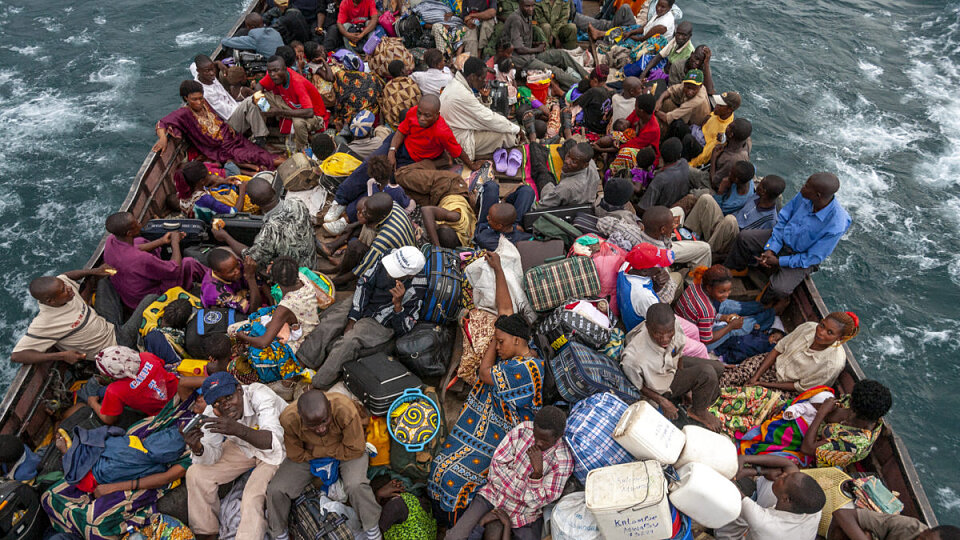What Does the Bible Say About Refugees/Immigrants/Internationals?
Twelve years ago, my parents opened a broken screen door. As we walked into the apartment, a flurry of children greeted us as we sat down on the floor. They looked at us, curious as to why a family of Americans were sitting in their living room. Delighting to host us, the mom brought in Coca-Cola cans and Sprite cans on a silver platter from Walmart. This was a family of refugees from Sudan. The husband and father died prior to their entrance in the refugee camp. After months, they finally made it to America. Now, they were hosting a family of Christians in the middle of an apartment complex in Nashville. Even though my family had never traveled outside North America, we were engaging with a family from a civil war-torn country thousands of miles away.
Today, there are 103 million people forcibly displaced worldwide. 32 million people are refugees while another 4.9 million seek asylum. Immigrants comprised 13.6% of the United States population in 2021*. In our globalized world, the opportunity for Christians to minister to refugees, immigrants, and internationals continues to increase, especially in America. How? Because internationals living as refugees or immigrants present an opportunity to reach the unreached and hard-to-reach in our own backyard. These peoples are often more open to the Gospel after being displaced from their homeland. God places the Church in a perfect position in order to advance the Gospel among people of every nation, tribe, and tongue through ministry to refugees, immigrants, and internationals. We need to know what the Bible says about reaching refugees, immigrants, and internationals.
*https://www.unhcr.org/refugee-statistics/
God is Sovereign Over Every Situation and Every Person
“And [God] made from one man every nation of mankind to live on all the face of the earth, having determined allotted periods and the boundaries of their dwelling place, that they should seek God, and perhaps feel their way toward him and find him” (Acts 17:26-27). God sovereignly rules over every situation and every person. He does not take His hands off of the steering wheel. So that we may seek him, God has determined where we will dwell and when we will live. Nothing happens outside the rule and design of the King. This includes refugees, internationals, and immigrants. Even though the events leading to these circumstances may be difficult, God uses them to bring people to Him. As Christians, we must look at these situations with a set of Christ-centered glasses. A refugee crisis or immigration from one country to another can be the incident that leads a person to find the Gospel. Sudan is an unreached country, but because this family moved to Nashville, they were able to hear the Gospel and interact with Christians. It was not the civil war that did it. God determined it so they would hear the Gospel and perhaps seek Him and find Him.
Christians and Refugees Are More Similar Than You Think
As Christians, we have more in common with refugees than any other people on earth. Because refugees are displaced from their homes, culturally, societally, and physically, they are not where they are supposed to be. Similarly, in Christ, this world is not our home. “For here we have no lasting city, but we seek the city that is to come” (Heb. 13:14). We feel it. The world hates us (John 18). We are not in our home, but we await the home to come. Jesus Christ, as a babe, became a refugee when his family trekked to Egypt to escape political oppression.
Just like Christian Pilgrim in The Pilgrim’s Progress, we make our way to the King in the Celestial City. If anyone should be able to sympathize with refugees and immigrants, it should be Christians. We should treat them with a kindred spirit in the Spirit of Christ. We are poor, wayfaring strangers in a world that is not our home. We both await the day when we can make it to our home. For refugees, many of them desire to return to their country of origin. For Christians, we desire to return to our Christ.
Love Your Neighbor, the Sojourner
One of the overwhelming themes throughout the New Testament is that “love is the fulfilling of the Law” (Rom.13:10). Jesus sums up the law as “loving God with your entire being and loving others as yourself.” For the nation of Israel in the Old Testament, this included loving the sojourners traveling among them. Moses says God “loves the sojourner, giving them food and clothing.” From this, God implores them to “love the sojourner, therefore, for you were sojourners in the land of Egypt” (Deut. 10:18-19). God made the direct correlation between the Israelites living as refugees in Egypt during their captivity and the sojourners that they would come across in their migration. Deuteronomy provides much care for the landless people mingling with Israel. God commands an additional tithe (Deut. 14:28-29), a place at their table during feasts(16:14), fair justice (24:17), and leftovers from the crops and fields (24:19-21). Even though the nation of Israel was the direct recipient of the Old Testament as God’s chosen people, He lays the foundation for the future inclusion of the Gentiles, including the refugees. He wants to show that the sojourners need care. They are our neighbors as well.
Reaching the Unreached in Our Backyard
“And they sang a new song, saying: ‘You are worthy to take the scroll and to open its seals, because you were slain, and with your blood you purchased for God persons from every tribe and language and people and nation’” (Rev. 5:9). One day, there will be people from every people group, worshiping Jesus Christ. Yet today, there are still nearly 3.5 billion people in the world who have little to no access to the Gospel. These people live in places where it is hard to minister geographically, politically, and culturally. How can we reach these peoples? Through internationals, immigrants, and refugees. Many of these people want to return home to places where people in the Western world cannot go. If their lives are transformed by the Gospel, then they can become better missionaries than we can imagine. As Christians, we need to embrace “reverse missions.” Normal missions efforts send missionaries to people groups. With reverse missions, the people groups come to the missionaries. This is what we see with the internationals, immigrants, and refugees that God brings to us. God is sovereign over every person’s situation. He allows people to become refugees and immigrants in order that they can carry the Gospel back to their home country. We can reach the unreached in our backyard, working toward the reality of Revelation 5:9, through internationals, immigrants, and refugees.
Photo Credit: IMB
Thank you for taking the time to read this article.
Follow us on social media for more daily content: ![]()
![]()
![]()
 Christian serves as the Director of Mobilization/Missions
Christian serves as the Director of Mobilization/Missions
as he leads the For the Nations ministry for The Journey Church in Lebanon, TN. He is married to his wife Danyel.
TOPICS
- Missions, Politics




